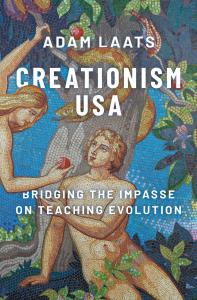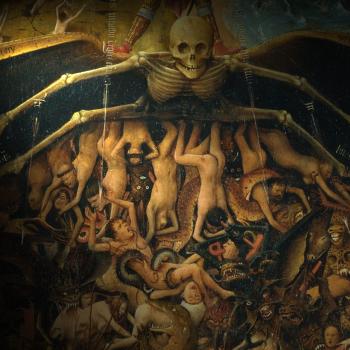Adam Laats is Professor of Education and History (by courtesy) at Binghamton University (SUNY). He is the author of Fundamentalist U (Oxford University Press, 2018) and The Other School Reformers (Harvard University Press, 2015). His most recent book, appears this week. Adam is here this week with a piece to whet our appetites for his just-published book, Creationism USA (Oxford University Press, 2020).
 It’s one of the most durable myths about America’s culture wars. Religious Americans, we are told by everyone from the New York Times to The Simpsons, have always fought against science. It’s a myth that endures despite repeated debunkings by scholars. Yet it’s simply not true. When it comes to the science of evolution, for example, the big differences are not between religious people and non-religious. They couldn’t be, for a couple of reasons.
It’s one of the most durable myths about America’s culture wars. Religious Americans, we are told by everyone from the New York Times to The Simpsons, have always fought against science. It’s a myth that endures despite repeated debunkings by scholars. Yet it’s simply not true. When it comes to the science of evolution, for example, the big differences are not between religious people and non-religious. They couldn’t be, for a couple of reasons.
First of all, most Americans are creationists of one sort or another, and the vast majority of them have absolutely no problem with evolutionary science. Second, opinions about evolution do not actually depend on knowledge of actual evolutionary science. Rather, they are about evolution as a symbol, a side in much broader cultural conflicts.
Let’s examine those claims one at a time. Are most Americans really creationists? It’s always hard to tell for sure what people believe, but poll results from the 1980s onward have been consistent. Since 1983, between 91% and 78% of respondents have told Gallup pollsters that God must have played some role in creating humanity.
It doesn’t mean that all creationists agree on the meaning of creationism. Though journalists often equate the term “creationism” with a rejection of evolutionary science, plenty of creationists have absolutely no reason to dispute mainstream science. Many of them might be Catholics who follow Pope Francis, who said in 2014 that God’s creativity is not like a “magic wand as to be able to do everything.” God creates, Francis explained, and evolution evolves. Or they might be Muslims who agree with Sheikh Hamza Yusuf. In 2012, Yusuf explained his Islamic vision: All we know for sure is that God said “be, and it is.” Anything else humans might tell you about the facts of creation is the “height of arrogance.” Or they might be evangelical Protestants who side with Francis Collins. As Collins explained in 2007, “The God of the Bible is also the God of the genome.”
If so many religious people do not dispute the scientific truths about evolution, why do we keep hearing that they do? The true landscape of America’s creation/evolution dispute is not really about evolutionary science itself, but about the broader culture war in which evolution has always been embedded. In short, opinions about evolution are not really about evolutionary science, but about picking a side in culture-war politics. As science-communication scholar Dan Kahan has said, statements about evolution are not about what we know, but about who we are.
On one hand, people who say they believe in evolution tend not to know the science any better than those who say they don’t believe in it. On the other, those who say they disbelieve do not dispute the importance of evolutionary theory itself, but only what it represents.
Consider the results of a couple of studies of knowledge and belief. As one Harvard study concluded, “participants . . . were no more likely to endorse the statement ‘natural selection is the best explanation for how a species adapts to its environment’ if they understood natural selection than if they did not.” In a different study, just under a hundred non-majors in an undergraduate biology class were quizzed on their ideas about evolution and creation. The results? Among these students, researchers found “no relation between knowledge and acceptance of animal or human evolution.” In spite of the durable myths about creationism and evolution, knowledge is not simply on the side of evolutionary science. Plenty of people choose to believe in evolution without actually knowing what it means.
On the other side, there are some creationists who reject evolution without really disputing its value as scientific knowledge. Unlike the majority of creationists who might agree with Pope Francis, Sheikh Yusuf, or Dr. Collins, these creationists—in my new book I call them “radical” creationists—dispute the implications of evolutionary science, yet they do not dispute the importance of evolutionary science.
It can be difficult to recognize this truth about creationism, so it is worth repeating: Even the radical creationists—the ones who believe the earth and humanity was created as-is within the last 10,000 years or so—even these radicals do not dispute the scientific importance of the ideas of evolutionary theory. Even radical creationists such as Ken Ham at Answers In Genesis—the man behind the huge replica Noah’s Ark in Kentucky where models of baby dinosaurs ride out the global flood on Noah’s Ark—even such radicals recognize the need for children to learn mainstream evolutionary theory.
Pundits from Answers In Genesis, for example, preach that radical creationists should teach evolution to their children. To be sure, they want children to learn about evolution in a different way. They want their children to learn about evolution so that they will understand why they shouldn’t believe it. They think young radicals should “learn about evolution from someone who will point out the weaknesses and inconsistencies.”
Yet even these radical creationists recognize that evolutionary science is one of the building blocks of modern scientific thinking. They agree that a complete education must include a thorough grounding in the ideas of evolutionary science. For radical creationists like the ones at Answers In Genesis, the problems with evolution do not derive from a knowledge of evolutionary science itself. Rather, the dangers of evolution—from this radical perspective—result from the implications of a broader sort of evolutionary thinking.
As Ken Ham has argued, evolutionary science itself is something that creationists should know about, precisely because evolutionary thinking has led to such catastrophic “moral decay” in historically Christian societies. The sinister influence of evolutionary thinking, Ham believes, can be blamed for the legalization of abortion; for the growing acceptance of LGBTQ rights; for the diminishing influence of Christianity in mainstream culture, and even for widespread efforts to replace “Merry Christmas” with “Happy Holidays.”
For Ken Ham and other radical creationists, the fight against LGBTQ rights, abortion, and a broad tendency toward a secular public square might be described as a fight against evolution. But it is not really a fight against evolutionary science. Radicals recognize the value and importance of learning evolutionary theory, if only to learn why they shouldn’t believe it.
On the other side, people who say they believe or accept the truths of evolutionary science don’t often know what those truths are. At least, they are statistically not any more likely to know evolution than radical creationists are.
Though America’s culture wars are often depicted as battles of knowledge against belief, as fights of religion against science, they are in fact far more complicated. Belief, knowledge, politics, and religion are tangled together in a dizzying variety of ways. The dividing line is not between religion and science or between knowledge and ignorance, but rather between sides in a far more comprehensive culture war. The most important questions are not about evolutionary science, but far more basic: about abortion rights, LGBTQ rights, and the proper role of Christianity in mainstream culture.
Americans, in the end, are not divided about the science of evolution. We are just divided, period. Evolution has become a symbol of those divisions, a flag we can wave to signal our allegiances.












